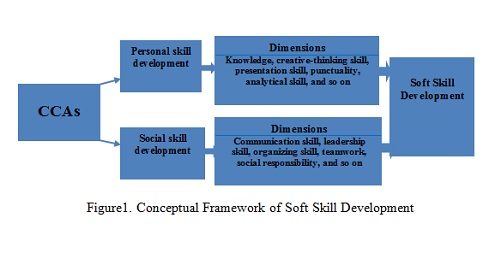
Examining the Linkage between Students’ Participation in Co-curricular Activities and their Soft Skill Development
Abstract
Keywords
Full Text:
PDFReferences
Ahmed, M., Rahman, M.F., Ali, M., Rahman, F.N., & Al-Azad, M.A.S. (2015). Effect of extracurricular activity on student’s academic performance. Journal of Armed Forces Medical College (JAFMC), 11(2), 41-46.
Basher, Z., & Javed, T. (2012). The Effectiveness of co-curricular activities on academic students of secondary schools students in district Abbottabad Pakistan. Developing Country Studies, 2(2), 53-59.
Brandfon, J. (2018). The impact of cocurricular involvement and leadership roles on the perceived development of employability skills (Doctoral dissertation). Retrieved September 13, 2019, from https://pdfs.semanticscholar.org/fd69/f36c57bff85024215717a6e255168390b18e.pdf
California State University, Fullerton. (2010). Student co-curricular activities. Retrieved August 20, 2019, from http://hr.fullerton.edu/documents/professionaldevelopment/ubi/univleadacademy/StudentCo-CurricularReport2010.pdf
Cariaga, J.N., & Molina, J. (2016). The impact of extra-curricular activities in the personal development of the members of the performing groups of Philippine Normal University-North Luzon. International Journal of World Research, 1(25), 74-91.
Chua, C.J. E., Chuatoco, I.A. G., Dela Pena, A. M.C., Jimenez, D.L. F., & Co, D. A. (2017). The influence of participation in extracurricular activities to the employability of industrial engineering graduates of one private university in the Philippines. Asia Pacific Journal of Multidisciplinary Research, 5(2), 163-170.
Cimatti, B. (2016). Definition, development, assessment of soft skills and their role for the quality of organizations and enterprises. International Journal for Quality Research, 10(1), 97-130.
Daniyal, M., Nawaz, T., Hassan, A. & Mubeen, I. (2012). The effect of co-curricular activities on the academic performances of the students: A case study of the Islami University of Bahawalpur, Pakistan. Bulgarian Journal of Science and Education Policy, 6(2), 257-272.
Dhanmeher, B. R. (2014). Impact of co curricular activities on the non- academic development of junior college students (M.Phil dissertation). DY Patil University, Navi Mumbai, India.
Freeman, R. (2017). The relationship between extracurricular activities and academic achievement (Doctoral dissertation, National Louis University, Chicago, USA). Dissertations, 245, Retrieved September 13, 2019, from https://digitalcommons.nl.edu/cgi/viewcontent.cgi?article=1254&context=diss
Ingale, A. R. (2014). Role of co-curricular activities in student’s life. Scholarly Research Journal for Humanity Science and & English Language, 1(IV), 592-594.
Ismail, M., Nadeem, M., Hussain, M. H., Shaheen, M. A., Shahid, M., Ahmad, R., & Mehmood, U. (2016). Role of ECA’s (extra-curricular activities) in personality development. International Journal of Research Studies in Biosciences, 4(11), 47-56.
Ivaniushina, V. A., & Zapletina, O.O. (2015). Participation in extracurricular activities and development of personal and interpersonal skills in adolescents. Journal of Siberian Federal University, 11, 2408-2420. DOI: 10.17516/1997-1370-2015-8-11-2408-2420
Ivanova, V., Martins, K., & Kaftasev, S. (2017). About extra-curricular activities of the university graduate-student’ viewpoint. MATEC Web of Conferences, 91 (2017), 1-4. https://doi.org/10.1051/matecconf/20179101017
Jamal, A. A. (2012). Developing interpersonal skills and professional behaviors through extracurricular activities participation: A perception of King Abdulaziz University medical students. Journal of King Abdulaziz University Medical Sciences, 19(4), 3- 24.
Johnston, L. H. (2013). The effects of extracurricular activities on academic performance and retention in the Middle Tennessee State University horse science program (Master’s thesis, The Middle Tennessee State University, Tennessee, USA). Retrieved from https://jewlscholar.mtsu.edu/bitstream/handle/mtsu/3561/Johnston_mtsu_0170N_101 28.pdf?sequence=1&isAllowed=y
Kraska-Miller, M. (2014). Non-parametric statistics for social and behavioral sciences. London and New York: Taylor & Francis.
Kumar, T. R., & Selvaraju, R. (2014). Personality development through co-curricular activities. Indian Journal of Research, 3(6), 59-61.
Le, T. (2013). Does participation in extracurricular activities reduces risky behavior? Youth in Focus. Youth in Focus Project Discussion Paper Series, No. 13, The Australian National University.
Learning Disabilities Association of Canada. (n.d.) What are social skills? Ottawa. Retrieved October 1, 2019, fromhttps://www.ldabc.ca/wp-content/uploads/2012/08/English- Social-Emotional.pdf
Leung, C., Ng, C. W. R., and Chan, P. (2011). Can co-curricular activities enhance the learning effectiveness of students? an application to the sub-degree students in Hong Kong? International Journal of Teaching and Learning in Higher Education, 23(3), 329-341.
Lunenburg, F. C. (2010). Extracurricular activities. Schooling, 1(1), 1-4.
Mehmood, T., Hussain, T., Khalid, M., & Azam, R. (2012). Impact of co-curricular activities on personality development of secondary school students. International Journal of Humanities and Social Welfare, 2(18), 139-145.
Nachmias, F. C., & Nachmias, D. (2008). Research methods in the social sciences. New York: Worth Publishers.
National Association of School Psychologists. (2002). Social skills: promoting positive behavior, academic success, and school safety. Maryland: Author. Retrieved September10, 2019, from http://mendocinousd.org/view/81.pdf
Nghia, T. (2017). Developing generic skills for students via extra-curricular activities in Vietnamese universities: Practices and influential factors. Journal of teaching and Learning for Graduate Employability, 8(1), 22-39.
Prianto, A. (2016). The effect of the involvement intensity in extracurricular activities and soft skills towards readiness to work for higher education graduates in East Java Indonesia. The Journal of Business and Management Invention, 5(6), 79-87.
Ritchie, G. M. (2018). The impact of academic co-curricular activity participation on academic achievement: a study of catholic high school seniors (Doctoral dissertation, Seton Hall University, South Orange, New Jersey, USA). Retrieved from https://scholarship.shu.edu/cgi/viewcontent.cgi?article=3564&context=dissertations
Siddiky, M. R. (2019). Developing Co-curricular Activities and Extra-curricular Activities for All-round Development of the Undergraduate Students: A Study of a Selected Public University in Bangladesh. Pakistan Journal of Applied Social Sciences, 10, 61-82.
Singh, A. (2017). Effects of co-curricular activities on academic achievements of students. International Journal of Education and Multidisciplinary Studies, 6(3), 241-254.
Singh, A., & Mishra, S. (2015). Extracurricular activities and student’s performance in secondary school of government and private schools. International Journal of Sociology and Anthropology Research, 1(1), 53-61.
Villalobos, A. S., Dulce, A.C., Fontilar, L.J., Gutierrez, D.C., Sawali, R.C., & Almero-Encio, H. (2016). Benefits of co-curricular activities to academic performance of financial and management accounting students. Asia Pacific Journal of Arts and Sciences, 3(1), 83-93.
Vos, S.S., Sabus, A., Seyfer, J., Umla, L. Gross-Advani, C., & Thompson-Oster, J. (2018). Using continuing professional development to create meaningful co-curricular learning opportunities for all student pharmacists. American Journal Pharmaceutical Education, 82(4), 327-336.
DOI: http://dx.doi.org/10.31258/jes.4.3.p.511-528
Refbacks
- There are currently no refbacks.
Copyright (c) 2020 Md. Roknuzzaman Siddiky

This work is licensed under a Creative Commons Attribution 4.0 International License.
Publisher: FKIP Universitas Riau












